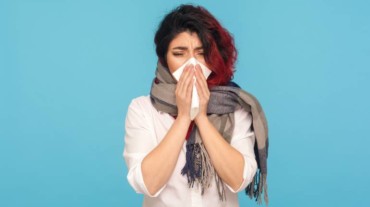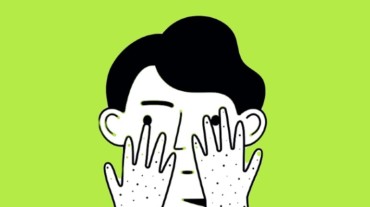
If every time you cough, sneeze, get a headache, or feel feverish you can’t help but picture yourself in an isolation ward, battling the covid-19 flu–you’re not exactly at fault. After all, the deadly coronavirus pandemic has infected over 1,00,000 people across the world and the numbers are only increasing by the day. And there’s only so much positivity that one can maintain, right?
Moreover, the virus, with its strikingly-similar symptoms as that of a seasonal flu, has chosen to make its debut in our country during a seasonal change, when allergies and flus are anyway a common occurrence, causing even more confusion and chaos.
Let’s talk about these confusing similarities first
According to a review published in the Johns Hopkins Medicine, the following symptoms happen both in the case of a coronavirus infection and a seasonal flu:
*Fever, cough, body aches, fatigue.
*Vomiting and diarrhoea.
*Lead to pneumonia.

Also, read: This doctor talking to his patients about coronavirus is the only thing you need to see today
When it comes to transmission, similarities continue to make their presence known because both through droplets in the air when an infected person coughs, sneezes, or talks.
Both require symptomatic treatment, as the seasonal flu and coronavirus infection can be tackled by symptomatic treatment that involves relieving the symptoms such as fever and headache.

Both the flus can be prevented by eliminating contact with infected people, frequent and thorough hand washing, and coughing and sneezing into the crook of your elbow.
People who are at risk in both cases are the same as young children, adults 65 years of age and older, pregnant women, and people with certain medical conditions such as asthma, diabetes, cancer, and heart diseases are the most hit.
Select Topics of your interest and let us customize your feed.
PERSONALISE NOWSo how can you tell the difference between a seasonal flu and coronavirus infection?
Well, for starters the transmission is similar, but its rate is different
While both the flus are likely to be air-borne, coronavirus spreads rather speedily compared to a regular flu as per a Chinese study. In fact, it is also more likely to be more fatal than the regular flu—thanks to the fact that no vaccine has been found to counter the coronavirus infection as of now, despite the rigorous research.
Also, listen:
How can we differentiate between the strikingly-similar symptoms?
Both flus goof up your respiratory system. But they usually hit different parts of it. In most cases, influenza affects the eyes and the nose—basically, the upper part of the respiratory system. On the other hand, coronavirus is more likely to affect the lower part—throat and lungs.
This is exactly why there’s a slight difference in the symptoms too. While a seasonal flu is likely to cause headaches and runny/stuffy nose and itchy eyes as per the CDC; in the case of a coronavirus infection, you might experience shortness of breath and pain in the throat.
Another factor that can help you identify your affliction is to analyse how effective over-the-counter pills or prescribed antiviral medicines are for your symptoms. As per the CDC, they can help relieve the pain and make you recover faster. However, if it’s not just a flu, regular meds won’t really help.
That said, you don’t really have to wait out or become your own doctor. Seeking professional help is a must if you’re in doubt.
Also, watch:
Common sense can help too
The government is using contact tracing, which involves tracking down all the people that a person infected with coronavirus might have contacted from the time he/she got infected. Using this method personally can help you a great deal as well. Hence, if you’ve travelled abroad or been in contact with an infected person during the last one month of your life, it’s only smart and responsible to get tested for the virus instead of risking your own health and of those around you.
Remember, both influenza and coronavirus infection need to be dealt with sensibly.
Get Latest Updates on Preventive Care, Family Care, Reproductive Care, Self Care